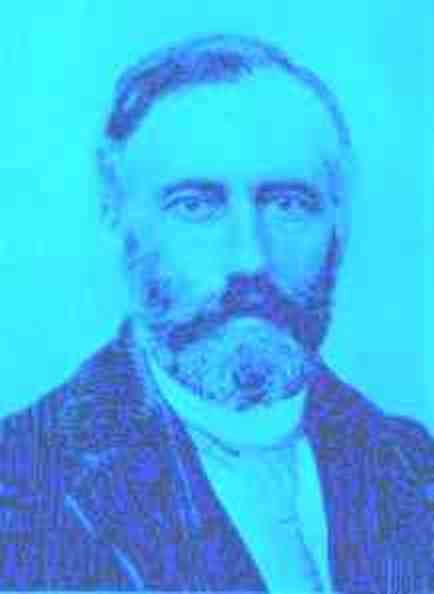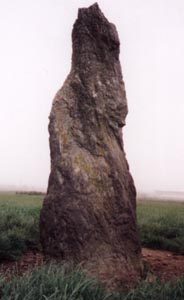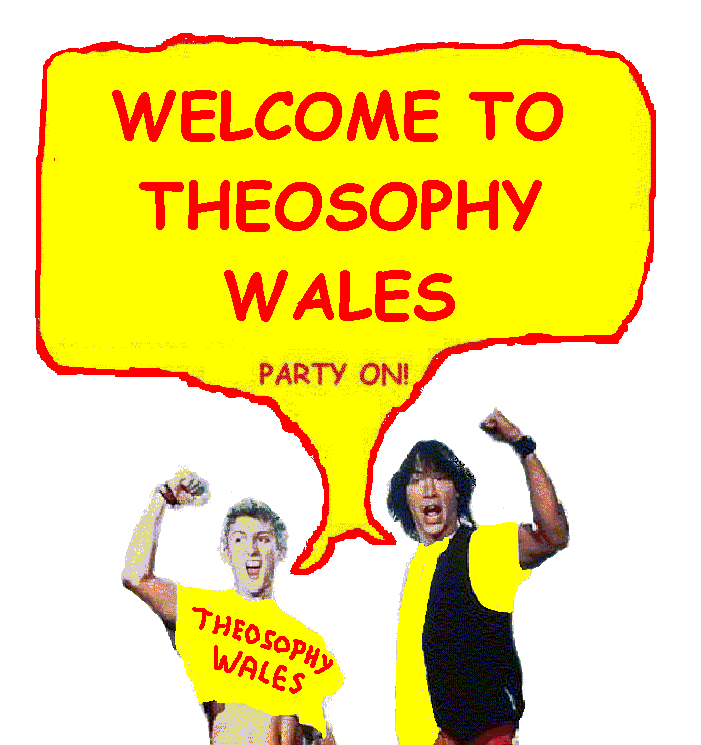
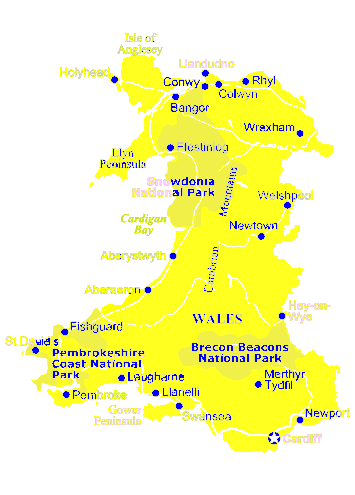
____________
THE
OF
THEOSOPHY
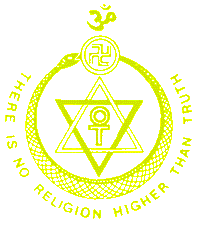
A Definitive Work on Theosophy
By
William Quan Judge
CHAPTER
13
Devachan
Having shown that just beyond the threshold of human life
there is a place of separation wherein the better part of man is divided from
his lower and brute elements, we come to consider what is the state after death
of the real being, the immortal who travels from life to life. Struggling out
of the body the entire man goes into kama loka, to purgatory, where he again
struggles and
loosens himself from the lower skandhas; this period
of birth over, the higher principles, Atma-Buddhi-Manas, begin to think in a
manner different from that which the body and brain permitted in life. This is
the state of Devachan, a Sanskrit word meaning literally "the place of the
gods," where the soul enjoys
felicity; but as the gods have no such bodies as ours,
the Self in devachan is devoid of a mortal body. In the ancient books it is
said that this state lasts "for years of infinite number," or
"for a period proportionate to the merit of the being"; and when the
mental forces peculiar to the state are exhausted, "the being is drawn
down again to be reborn in the world of mortals."
Devachan is therefore an
interlude between births in the world. The law of karma which forces us all to
enter the world, being ceaseless in its operation and also universal in scope,
acts also on the being in devachan, for only by the force or operation of Karma
are we taken out of devachan. It is something like the
pressure of atmosphere which, being continuous and
uniform, will push out or crush that which is subjected to it unless there be a
compensating quantity of atmosphere to counteract the pressure. In the present
case the karma of the being is the atmosphere always pressing the being on or
out from state to state; the counteracting quantity of atmosphere is the force
of the being's own life-thoughts and aspirations which prevent his coming out
of devachan until that force is exhausted, but which being spent has no more
power to hold back the decree of our self-made mortal destiny.
The necessity for this state after death is one of the
necessities of evolution growing out of the nature of mind and soul. The very
nature of manas requires a devachanic state as soon as the body is lost, and it
is simply the effect of loosening the bonds placed upon the mind by its
physical and astral encasement.
In life we can but to a fractional extent act out the
thoughts we have each moment; and still less can we exhaust the psychic
energies engendered by each day's aspirations and dreams. The energy thus
engendered is not lost or annihilated, but is stored in Manas, but the body,
brain, and astral body permit no full development of the force. Hence, held
latent until death, it bursts then from the weakened bonds and plunges Manas,
the thinker, into the expansion, use, and development of the thought-force set
up in life.
The impossibility of escaping this necessary state
lies in man's ignorance of his own powers and faculties. From this ignorance
delusion arises, and Manas not being wholly free is carried by its own force
into the thinking of devachan. But while ignorance
is the cause for going into this state the whole
process is remedial, restful, and beneficial. For if the average man returned
at once to another body in the same civilization he had just quitted, his soul
would be completely tired out and deprived of the needed opportunity for the
development of the higher part of his nature.
Now the Ego being minus mortal body and kama, clothes
itself in devachan with a vesture which cannot be called body but may be styled
means or vehicle, and in that it functions in the devachanic state entirely on
the plane of mind and soul. Everything is as real then to the being as this
world seems to be to us.
It simply now has gotten the opportunity to make its
own world for itself unhampered by the clogs of physical life. Its state may be
compared to that of the poet or artist who, rapt in ecstacy of composition or
arrangement of color, cares not for and knows not of either time or objects of
the world.
We are making causes every moment, and but two fields
exist for the manifestation in effect of those causes. These are, the objective
as this world is called, and the subjective which is both here and after we
have left this life. The objective field relates to earth life and the grosser
part of man, to his bodily acts and his brain thoughts, as also sometimes to
his astral body.
The subjective has to do with his higher and spiritual
parts. In the objective field the psychic impulses cannot work out, nor can the
high leanings and aspirations of his soul; hence these must be the basis,
cause, substratum, and support for the state of devachan. What then is the
time, measured by mortal
years, that one will stay in devachan?
This question while dealing with what earth-men call
time does not, of course, touch the real meaning of time itself, that is, of
what may be in fact for this solar system the ultimate order, precedence,
succession, and length of moments.
It is a question which may be answered in respect to
our time, but not certainly in respect to the time on the planet Mercury, for
instance, where time is not the same as ours, nor, indeed, in respect to time
as conceived by the soul. As to the latter any man can see that after many
years have slipped away he has no
direct perception of the time just passed, but is able
only to pick out some of the incidents which marked its passage, and as to some
poignant or happy instants or hours he seems to feel them as but of yesterday.
And thus it is for the being in devachan. No time is there. The soul has all
the benefit of what goes on within itself in that state, but it indulges in no
speculations as to the lapse of moments; all is made up of events, while all
the time the solar orb is marking off the years for us on the earth plane.
This cannot be regarded as an impossibility if we will
remember how, as is well known in life, events, pictures, thoughts, argument,
introspective feeling will all sweep over us in perfect detail in an instant,
or, as is known of those who have been drowning, the events of a whole life
time pass in a flash before the eye of the mind. But the Ego remains as said in
devachan for a time exactly proportioned to the psychic impulses generated
during life. Now this being a matter which deals with the mathematics of the
soul, no one but a Master can tell what the time would be for the average man
of this century in every land. Hence we have to depend on the Masters of wisdom
for that average, as it must be based upon a calculation.
They have said, as is well put by Mr. A. P. Sinnett in
his Esoteric Buddhism, that the period is fifteen hundred years in general.
From a reading of his book, which was made up from letters from the Masters, it
is to be inferred he desires it to be understood that the devachanic period is
in each and every case fifteen centuries; but to do away with that
misapprehension his informants wrote at a later date that that is the average
period and not a fixed one.
Such must be the truth, for as we see that men differ
in respect to the periods of time they remain in any state of mind in life due
to the varying intensities of their thoughts, so it must be in
devachan where thought has
a greater force though always due to the being who had the thoughts.
What the Master did say on this is as follows:
"The 'dream of devachan'
lasts until karma is satisfied in that direction. In devachan there is a
gradual exhaustion of force. The stay in devachan is proportionate to the
unexhausted psychic impulses originated in earth life. Those whose actions were
preponderatingly material will be sooner brought back
into rebirth by the force of Tanha." Tanha is the thirst for life. He
therefore who has not in life originated many psychic impulses will have but
little basis or force in his essential nature to keep his higher principles in
devachan.
About all he will have are those originated in
childhood before he began to fix his thoughts on materialistic thinking. The
thirst for life expressed by the word Tanha is the pulling or magnetic force
lodged in the skandhas inherent in all beings. In such
a case as this the average rule does not apply, since
the whole effect either way is due to a balancing of forces and is the outcome
of action and reaction.
And this sort of materialistic thinker may emerge out
of devachan
into another body here in a month, allowing for the unexpended psychic forces
originated in early life. But as every one of such persons varies as to class,
intensity and quantity of thought and psychic impulse, each may vary in respect
to the time of stay in devachan.
Desperately materialistic thinkers will remain in the devachanic condition
stupefied or asleep, as it were, as they have no forces in them appropriate to
that state save in a very vague fashion, and for them it can be very truly said
that there is no state after death so far as mind is
concerned; they are torpid for a while, and then they
live again on earth. This general average of the stay in devachan gives us the
length of a very important human cycle, the Cycle of Reincarnation. For under
that law national development will be found to repeat itself, and the times
that are past will be found to come again.
The last series of powerful and deeply imprinted
thoughts are those which give color and trend to the whole life in devachan.
The last moment will color each subsequent moment. On those the soul and mind
fix themselves and weave of them a whole set of events and experiences,
expanding them to their highest limit, carrying out all that was not possible
in life. Thus expanding and weaving these thoughts the entity has its youth and
growth and growing old, that is, the uprush of the force, its expansion, and its
dying down to final exhaustion.
If the person has led a colourless life the devachan
will be colourless; if a rich life, then it will be rich in variety and effect.
Existence there is not a dream save in a conventional sense, for it is a stage
of the life of man, and when we are there this present life is a dream. It is
not in any sense monotonous. We are too prone to measure all possible states of
life and places for experience by our present earthly one and to imagine it to
be reality.
But the life of the soul is endless and not to be
stopped for one instant. Leaving our physical body is but a transition to
another place or plane for living in. But as the ethereal garments of devachan
are more lasting than those we wear here, the spiritual,
moral, and psychic causes use more time in expanding
and exhausting in that state than they do on earth. If the molecules that form
the physical body were not subject to the general chemical laws that govern
physical earth, then we should live as long in these bodies as we do in the
devachanic state. But such a
life of endless strain and suffering would be enough
to blast the soul compelled to undergo it. Pleasure would then be pain, and
surfeit would end but in an immortal insanity. Nature, always kind, leads us
soon again into heaven for a rest, for the flowering of the best and highest in
our natures.
Devachan is then neither
meaningless nor useless. "In it we are rested; that part of us which could
not bloom under the chilling skies of earth-life bursts forth into flower and
goes back with us to earth-life stronger and more a part of our nature than
before. Why should we repine that Nature kindly aids us in the interminable
struggle, why keep the mind revolving about the present petty personality and
its good and evil fortunes? " (Letter from Mahatma K. H. See Path p. 191,
Vol. 5.)
But it is sometimes asked, what of those we have left
behind: do we see them there? We do not see them there in fact, but we make to
ourselves their images as full, complete, and objective as in life, and devoid
of all that we then thought was a blemish. We live with them and see them grow
great and good instead of mean or bad. The mother who has left a drunken son behind
finds him before her in devachan a sober, good man, and likewise through all
possible cases, parent, child, husband, and wife have their loved ones there
perfect and full of knowledge. This is for the benefit of the soul. You may
call it a delusion if you will, but the illusion is necessary to happiness just
as it often is in life. And as it is the mind that makes the illusion, it is no
cheat.
Certainly the idea of a heaven built over the verge of
hell where you must know, if any brains or memory are left to you under the
modern orthodox scheme, that your erring friends and relatives are suffering
eternal torture, will bear no comparison with the doctrine of devachan. But
entities in devachan are not
wholly devoid of power to help those left on earth.
Love, the master of life, if real, pure, and deep, will sometimes cause the
happy Ego in devachan to affect those left on earth for their good, not only in
the moral field but also in that of material circumstance. This is possible
under a law of the occult universe
which cannot be explained now with profit, but the
fact may be stated. It has been given out before this by H. P. Blavatsky,
without, however, much attention being drawn to it.
The last question to consider is whether we here can
reach those in devachan
or do they come here. We cannot reach them nor affect them unless we are
Adepts.
The claim of mediums to hold communion with the
spirits of the dead is baseless, and still less valid is the claim of ability
to help those who have gone to devachan. The Mahatma, a
being who has developed all his powers and is free from illusion, can go into the
devachanic state and then communicate with the Egos there.
Such is one of their functions, and that is the only
school of the Apostles after death. They deal with certain entities in devachan
for the purpose of getting them out of the state so as to return to earth for
the benefit of the race. The Egos they thus deal with are those whose nature is
great and deep but who are not wise enough to be able to overcome the natural
illusions of devachan.
Sometimes also the hypersensitive and pure medium goes
into this state and then holds communication with the
Egos there, but it is rare, and certainly will not take place with the general
run of mediums who trade for money. But the soul never descends here to the
medium. And the gulf between the consciousness of devachan and that of earth
is so deep and wide that it is but seldom the medium can remember upon
returning to recollection here what or whom it met or saw or heard in devachan.
This gulf is similar to that which separates devachan from rebirth; it is one
in which all memory of what preceded it is blotted out.
The whole period allotted by the soul's forces being
ended in devachan,
the magnetic threads which bind it to earth begin to assert their power. The
Self wakes from the dream, it is borne swiftly off to a new body, and then,
just before birth, it sees for a moment all the causes that led it to devachan
and back to the life it is about to begin, and knowing it to be all just, to be
the
result of its own past life, it repines not but takes
up the cross again -- and another soul has come back to earth.
______________________
THE
OF
THEOSOPHY

Find out more about
Theosophy with these links

The Cardiff Theosophical Society Website
The
National Wales Theosophy Website
If you run a Theosophy Group, please feel free
to use any of the material on this site
The Most Basic Theosophy
†Website in the Universe
A quick overview of Theosophy†
and the Theosophical Society
If you run a Theosophy Group you†
can use this as an introductory handout.
Theosophy Cardiffís Instant Guide
One liners and quick explanations
H P Blavatsky is
usually the only
Theosophist that
most people have ever
heard of. Letís put
that right
The Voice of the Silence Website
An Independent Theosophical Republic
Links to Free Online Theosophy†
Study Resources; Courses, Writings,†
The main criteria
for the inclusion of
links on this
site is that they have some
relationship
(however tenuous) to Theosophy
and are
lightweight, amusing or entertaining.
Topics include
Quantum Theory and Socks,
Dick Dastardly and Legendary Blues Singers.
A selection of
articles on Reincarnation
Provided in response
to the large†
number of
enquiries we receive at†
Cardiff
Theosophical Society on this subject
The Voice of the Silence Website
This is for everyone, you donít have to live
in Wales to make good use of this Website
No Aardvarks were harmed in the
The Blue Bridge aka the Jubilee
Bridge
crossing the river Dee at
Queensferry, North Wales
Built in 1926, the bridge could
be raised to
allow shipping through to
Chester, England
This traffic later ceased and
the lifting mechanism
was therefore removed in the
1960s
Ty Mawr (height approx 8
feet)
Near Holyhead, Anglesey,
North Wales.
The Spiritual Home of Urban Theosophy
The Earth Base for Evolutionary Theosophy
A B C D EFG H IJ KL M N OP QR S T UV WXYZ
Complete Theosophical Glossary in Plain Text Format
1.22MB
Quick Explanations with Links to
More Detailed Info
What is Theosophy ? Theosophy Defined (More Detail)
Three Fundamental Propositions† Key Concepts of Theosophy
Cosmogenesis†
Anthropogenesis†
Root Races†
Karma
Ascended Masters† After Death States† Reincarnation
The Seven Principles of Man† Helena Petrovna Blavatsky
Colonel Henry Steel Olcott William Quan Judge
The Start of the Theosophical Society
History of the Theosophical Society
Theosophical Society Presidents
History of the Theosophical Society in Wales
The Three Objectives of the Theosophical Society
Explanation of the Theosophical Society Emblem
Glossaries of Theosophical Terms
An Outstanding
Introduction to Theosophy
By a student of Katherine
Tingley
Elementary Theosophy Who is the Man?† Body and Soul
Body, Soul and Spirit† Reincarnation† Karma
What Theosophy Is† From the Absolute to Man
The Formation of a Solar System† The Evolution of Life
The Constitution of Man† After Death† Reincarnation
The Purpose of Life† The Planetary Chains
The Result of Theosophical Study
An Outline of Theosophy
Charles Webster Leadbeater
Theosophy - What it is† How is it Known?† The Method of Observation
General Principles† The Three Great Truths† The Deity
Advantage Gained from this
Knowledge† The Divine Scheme
The Constitution of Man† The True Man† Reincarnation
The Wider Outlook† Death† Manís Past and Future
Cause and Effect† What Theosophy does for us
Try these if you are looking for a local
Theosophy Group or Centre
UK Listing of Theosophical Groups
Please tell us about your UK Theosophy Group
___________________
into categories
and presented according to relevance of website.
Web Directory
- Add Link - Submit Article - Online Store - Forum
